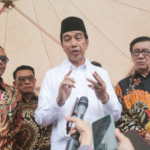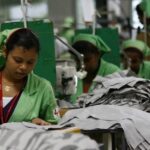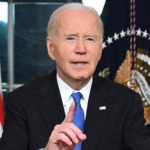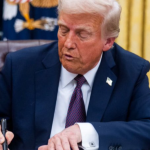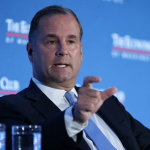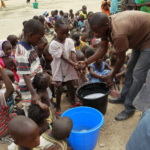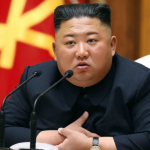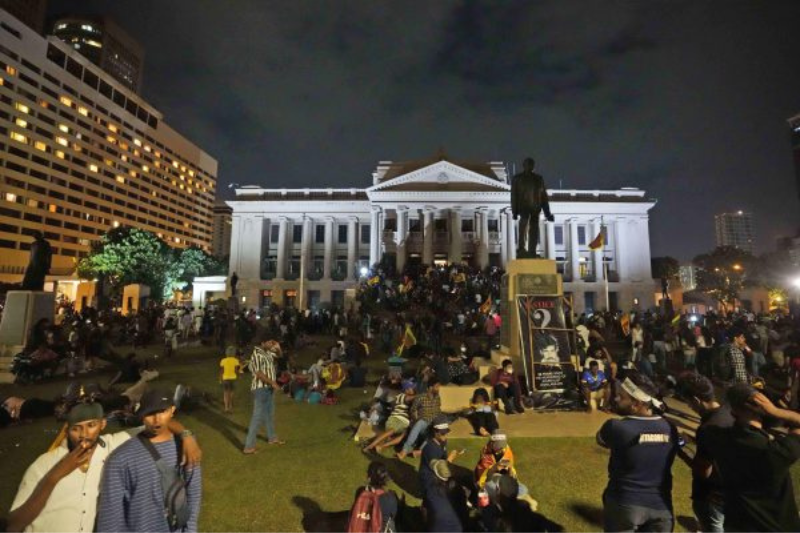
sri lanka’s silent struggle human toll amidst an ongoing conflict
On July 9, Sri Lanka commemorated the first anniversary of the historic uprising of the people known as “Aragalaya,” which means struggle.
Following unprecedented-scale protests from Sri Lankan citizens, President Gotabaya Rajapaksa resigned from abroad and fled the country a year ago.
The Rajapaksa family’s hold on power was finally broken by the uprising, which was brought on by the previous administration’s poor handling of the nation’s economy. Along with forcing out Gotabaya, the demonstrations also ousted Mahinda Rajapaksa, the prime minister.
The spirit of dissent among Sri Lankan citizens, who continued to demand justice, remained strong as the first anniversary of the Aragalaya played out. They remembered the bravery with which they had stood up to the suppression of their voices by the previous administration a year prior. But despite a change in government, the country continues to struggle with long-standing problems like debt, inflation, economic instability, and human rights abuses.
In March 2022, while he was still a student, Shabeer Mohamed, a freelance journalist and activist from Colombo, was instrumental in the first protests. For 12 hours, Mohamed was without electricity and power.
In a conversation with The Diplomat, Mohamed described the protests’ modest beginnings: “On March 1, 2022, I and five of my friends started the first silent protest in Sri Lanka near Colombo. We displayed three signs stating that we were unable to complete our work because we lacked both power and lighting.”
Other Sri Lankan citizens were motivated to start their protests as a result of the courageous act of protest carried out by Mohamed and his friends. They protested in the streets of their respective towns, raising awareness of their cause by holding signs and placards. Some people even decided to hold demonstrations close to the president’s home. As a result, more people felt compelled to speak out against President Gotabaya Rajapaksa’s mishandling of state affairs, which had begun to negatively impact the lives of common citizens. As a result, the number of protesters increased, signifying the movement’s growth.
Mohamed claimed that although the events of July were the culmination of ongoing protests, the journey there was not simple. He remembered how Rajapaksa imposed harsh crackdowns on demonstrators.
He recalled how the police injured people while violently arresting several people and firing gunfire and tear gas at protesters.15 people were detained, and some of them were taken to the hospital, he said. Mohamed recalled that many lawyers volunteered their time at the time and came to the police station to inquire as to why the protestors had been detained.
Except for the then-prime minister Mahinda Rajapaksa, all 26 members of the second Gotabaya Rajapaksa cabinet decided to resign on April 3, 2022, amid growing protests. Several officials and ministers, including members of the Rajapaksa family who held positions in parliament, were removed as the protests intensified and gained momentum. After that, Mahinda Rajapaksa decided to leave office, which allowed Ranil Wickremesinghe to become prime minister.
In July, a crucial event occurred that resulted in a historic victory for the Sri Lankan people. Colombo’s President’s House was occupied by protesters, forcing Gotabaya Rajapaksa to leave the nation. On July 20, after Rajapaksa’s prompt resignation, Parliament chose Wickremesinghe to lead the country.
Keep Reading
However, the victory only marked the start of a protracted and difficult recovery process for the nation. According to reports, it would take until 2026 for the economy to fully recover from the hardships experienced under the previous administration.
However, the fact that serious socioeconomic problems continue to plague the nation frustrates many Sri Lankans, including Mohamed. Shreen Saroor, a human rights activist, concurs with this viewpoint. She emphasizes that the island’s poor and marginalized communities took the brunt of the previous administration’s policies, where “impunity, corruption, and war crimes had become the norm.”
Human lives are being crushed behind this game of power:
One must realize that the Sri Lankan crisis is primarily due to poor governance rather than just debt, Saroor said in an interview with The Diplomat. “This country won’t recover permanently if the inflation and dollar crisis are artificially fixed and if we take an anti-democratic course.“
In Sri Lanka, the cost of living is still high, and “essential items are so expensive,” forcing some families to skip meals, as Saroor noted.
The government’s economic reform will focus even more on underprivileged communities. The number of women migrating to the Middle East as domestic workers without any protection is skyrocketing due to labor migration.
A single mother of three from a small town close to Kandy named Fathima (a pseudonym) claimed that she felt obligated to skip meals to take care of her kids.
Sometimes I can’t afford to eat, so I only keep enough for my kids. There is still no solution, but this was happening under the previous administration, she said. We still experience suffering and feel forgotten, and I’m unsure what to do.
The powerful words of Fathima illuminated the harsh reality that many Sri Lankans, especially those from disadvantaged backgrounds, must contend with. Numerous people are still faced with difficult decisions a year after the historic protests succeeded in their stated goal of toppling the president.
The most important sign of this crisis is that people are skipping meals, according to trade unionist and attorney Swasthika Arulingam, who spoke to The Diplomat. “Inflation combined with real wages falling has meant people have stopped eating,” she said. “People are altering their daily routines so they can consume fewer meals daily to save money… There are increasing numbers of kids fainting and growing slowly at schools.”
Although the government wants to “paint the picture that everything is stabilising,” Arulingam asserted that “on the ground, things are very dire.”
Arulingam was crucial in defending protesters in court and at police stations during last year’s demonstrations when people were wrongfully detained or intimidated by officers. She was in charge of organizing a two-day strike and organizing worker mobilization in the weeks leading up to July 9, 2022, as well as taking part in protests demanding respect for human rights.
In the name of repaying the debts owed, Arulingam contends that the president of Sri Lanka, the International Monetary Fund (IMF), and foreign creditors are committing an “economic crime on the Sri Lankan people.” According to reports, Sri Lanka has a total debt of more than $83 billion, of which $41.5 billion is foreign and $42.1 billion is domestic.
According to Arulingam, “The IMF and the government are only concerned with how to pay back the debt, so even if people die of starvation, due to a lack of food, or due to the absence of essential medicines, the entire economy is being structured towards paying back that debt to international creditors.” “But the borrowed money was never used for the good or welfare of the Sri Lankan people.”
The dissemination manager at People’s Rights Group Sri Lanka, Baazir Rahman, is also worried that no long-term solutions have been put in place.
Rahman told The Diplomat that several factors contributed to the Sri Lankan government’s inability to resolve the nation’s debt issues. “First, persistent economic mismanagement, reckless spending, and corruption have made it challenging to allocate resources and effectively manage debt.“
The poor management, in Rahman’s opinion, was responsible for “excessive borrowing, inefficient use of funds, and a lack of transparency.” A flawed tax system, weak collection methods, and a sizable informal economy have all made it difficult for the government to raise enough money.
External factors like the state of the global economy and geopolitical unpredictability have put additional strain on the economy. Inconsistent economic policies and investor uncertainty have been exacerbated by the instability in the government cabinet, Rahman said.
Additionally, he thinks that racism-related problems have harmed the government’s reputation and capacity to win support from other countries by making it less accountable in the international community. He emphasised the value of putting in place “sound fiscal policies, improving transparency,” and diversifying the economy.
Rahman asserts that addressing these issues, as well as ensuring “political stability” and resolving racial tensions, will help Sri Lanka’s citizens have a sustainable economic future.
End note-
Sri Lankans’ fight for peace and justice shows their resilience. Peaceful protests have overcome violence, economic instability, racism, and debt. While long-term solutions must be implemented quickly if the nation is to fully recover from its current crisis, it can look back on July 9th with pride knowing that their collective efforts brought about meaningful change. The Aragalaya uprising shows how one voice can make a difference when multiplied many times. Sri Lanka’s society and economy still need much work.

